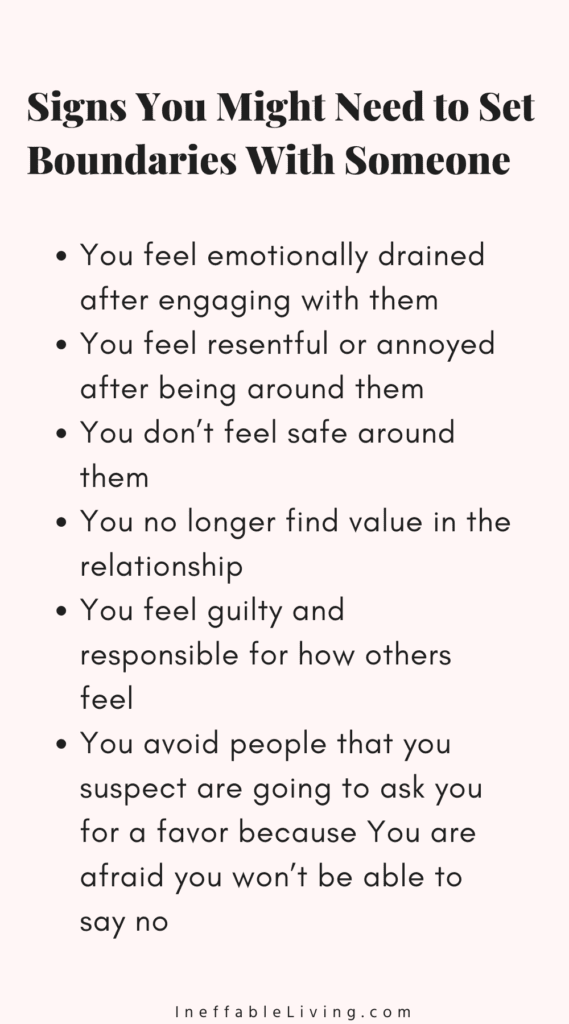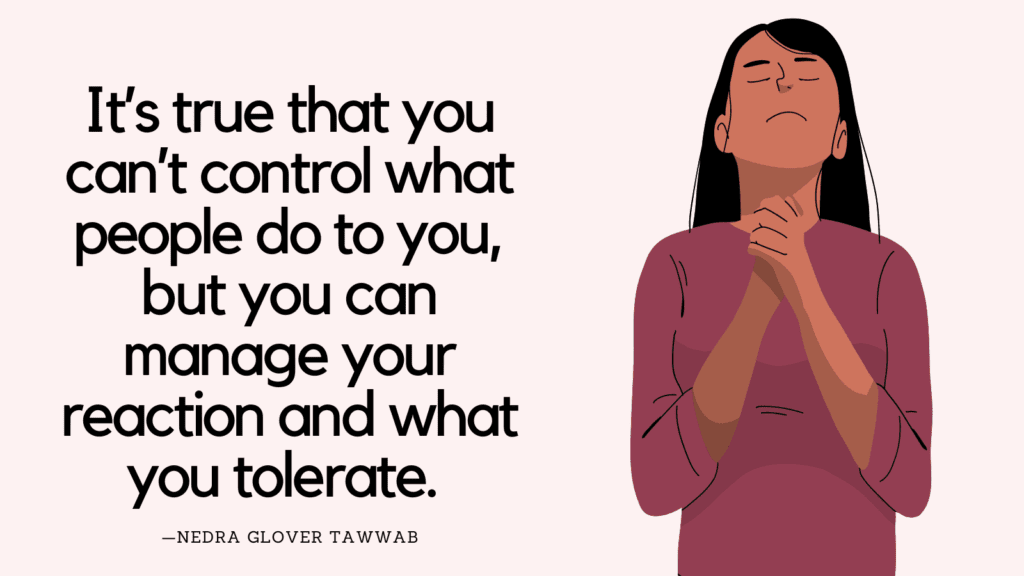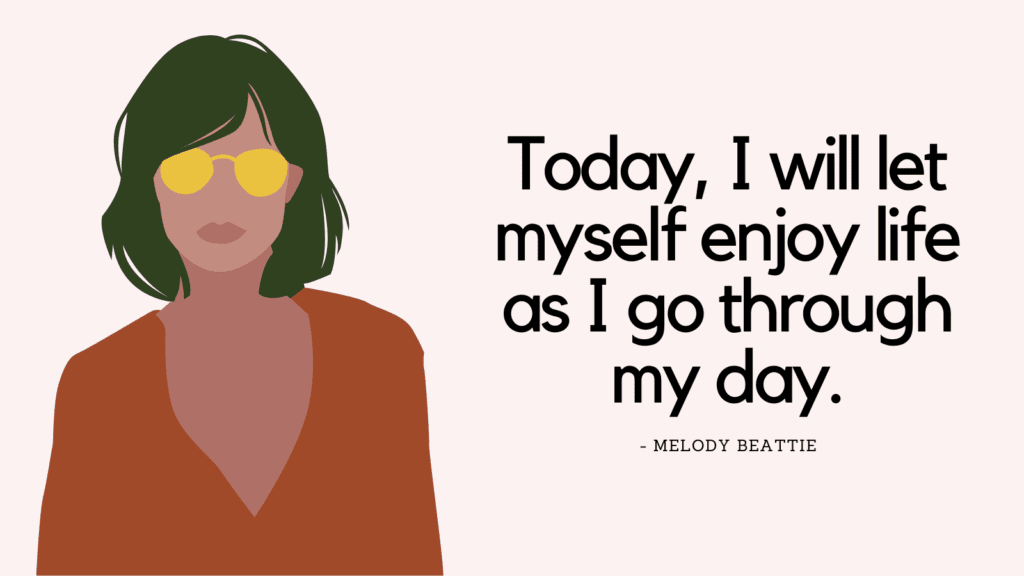This post contains some of the best stop tolerating bad behavior quotes.
Stop Tolerating Bad Behavior Quotes
1. “For our relationships to improve, we assume that the other person has to change. We’re unaware of the aspects that are within our control, such as setting boundaries. But when we do set boundaries, our relationships change because we’ve changed what we’re willing to tolerate.”— Nedra Glover Tawwab
2. “We tolerate unhealthy boundaries because we don’t understand our feelings, and we fail to notice the discomfort. We see that something is “off,” but we’re unaware of what is causing the discomfort.”—Nedra Glover Tawwab
Related: Codependency And Enmeshment: 9 Signs You May Be In An Enmeshed Relationship
3. “Boundaries can be cast in iron and uncompromising, or they can be loose and easily compromised, or they can be nonexistent and symptomatic of low self- esteem. They set the tone for what we will, and will not, tolerate.”— Jayne Hardy
4. “Our biggest fear is that we’ll lose people, so we tolerate boundary issues to maintain our relationships.”—Nedra Glover Tawwab
5. “Setting limits is uncomfortable, and that discomfort is enough for most of us to shy away from setting them. So we stay silent. We can’t tolerate the discomfort of having what we assume will be difficult conversations.”—Nedra Glover Tawwab
6. “The nonverbal way we communicate says so much more than the words that fall out of our mouths about what we will and won’t tolerate: our body language, facial expressions, and tone of voice; how we react in certain situations and whether we mean what we say and say what we mean; our sincerity, surety, and confidence; our uncertainty and inauthenticity.”— Jayne Hardy
Related: Caregiving vs Caretaking (The Savior Complex)
7. “The short-term discomfort of setting a boundary isn’t a reason to continue tolerating the longer-term discomfort of the issues that inevitably result. Unhealthy relationships are frustrating and damaging to our long-term well-being. Over time and with consistent practice, setting boundaries becomes easier.”—Nedra Glover Tawwab
8. “We convey our boundaries from the very beginning of a relationship: what we’re willing to tolerate, what’s right and wrong for us, our likes and dislikes, how we communicate, and how respectful we are or aren’t.”—Jayne Hardy
9. “Some relationships are doomed from the outset, but not all toxic relationships start out that way—some morph into being unhealthy, unsupportive, and unkind.”—Jayne Hardy
10. “It’s true that you can’t control what people do to you, but you can manage your reaction and what you tolerate.”—Nedra Glover Tawwab
Related: Codependency Quiz (+FREE Codependency Worksheets PDF)
11. “The experience of trauma shifts our brain and body into survival mode. This is one way in which unhealthy boundaries become a tool for survival.”—Nedra Glover Tawwab
12. “A toxic, unhealthy, and unkind relationship is one that stunts our personal growth, one within which it feels difficult to thrive and bloom. Quite often, it’s one where someone is putting up and shutting up about big or small stuff that’s compromising and oppressing their safety and self-identity— emotionally, mentally, physically, and spiritually.”—Jayne Hardy
13. “Boundaries are complex things at the best of times, but workplace boundaries put a cat among the kittens. Talking about them is like opening a can of worms, and often, we feel powerless to change what’s complex, ingrained, inherited, and sometimes, downright unhealthy.”—Jayne Hardy
14. “Porous boundaries are weak or poorly expressed and are unintentionally harmful. They lead to feeling depleted, overextending yourself, depression, anxiety, and unhealthy relationship dynamics.”—Nedra Glover Tawwab
Related: What Causes Codependency? Top 6 Reasons You May Be Codependent
15. “We’re all worthy of boundaries that keep us safe, happy, and healthy. It’s in our cohabiting with others in a safe, comfortable, and healthy way where boundaries are vulnerable to going off script.”—Jayne Hardy
16. “Betting on the other person to read your mind is a recipe for an unhealthy relationship. Action is required.”—Nedra Glover Tawwab
17. “When people respond in an unhealthy way, it’s typically a sign that you needed limits a long time ago and that you need to reevaluate the relationship to assess whether your needs are being met satisfactorily.”—Nedra Glover Tawwab
18. “Healthy boundaries are clear, not too constricting or overpowering of others, designed by us, adaptable to differing situations and people as we see fit, not damaging to us or to anyone else. They force us to consider our limits and to respect the limits of others, as well as ensure that we take responsibility for our happiness and allow others to do the same. They communicate when we’ve had enough or have given all that we are prepared to give.”—Jayne Hardy
19. “Unhealthy friendships happen as a result of unhealthy boundaries. Friendships where you feel like you’re giving more than you’re receiving are harmful. Interactions with friends that often end in arguments are harmful.”—Nedra Glover Tawwab
Related: Best 50 Codependency Affirmations For Recovering Codependents
20. “Relationships that have the potential to be healthy often become unhealthy because of either rigid or porous boundaries. Either we are strict about them, or we give people free rein with no limits. These scenarios create one-sided relationships, in which one person does most of the work to keep the relationship going.”—Nedra Glover Tawwab
21. “There’s a difference between crafting boundaries and building barricades. Healthy boundaries are not insurmountable walls, just as they’re not nonexistent limits that have been trampled on and destroyed. They’re not the push-pull, reflex rebellion, or barricades we build around us to block everything out. Boundaries are rational, come from self-awareness, and allow us to encounter life at our own pace. They help us to maintain a healthy relationship between us and all else. They encompass our standards, what works for us and what doesn’t. Barricades come from a “life is blackand-white” place, whereas boundaries take into consideration all the shades of grey. Barricades mean we’re always primed to defend ourselves, to don our shield and guard, which depletes our energy. Boundaries protect our energy, enabling us to function effectively. Barricades are rigid, impenetrable, block intimacy, and cause isolation.”—Jayne Hardy

22. “Enabling is a significant part of a codependent relationship. It involves supporting the unhealthy behaviors of someone through action or inaction. Codependency usually happens as a result of unhealthy boundaries.”— Nedra Glover Tawwab
23. “Anger is a feeling of hostility or annoyance, and it can be expressed inwardly or outwardly. When expressed inwardly, people with unhealthy boundaries engage in negative self-talk, self-sabotage, self-blaming, or low self-esteem. Instead of holding others accountable, the anger becomes an issue within. This often causes anxiety, depression, or other mental health issues.”—Nedra Glover Tawwab
Related: Love Addiction Test (+ Resources For Love Addiction)
24. “Complaining to others won’t fix our unhealthy boundaries. Similar to gossiping, complaining is another way of processing frustration. However, with complaining, we usually play the role of victim, saying things like “Why does everyone expect so much from me? My husband knows I need help, but he doesn’t offer. I don’t understand why people can’t do things for themselves.””—Nedra Glover Tawwab
25. “People who are codependent suffer from unhealthy boundaries, selfesteem issues, people-pleasing tendencies, and the need for control. By helping toxic people, they receive a sense of fulfillment.”—Nedra Glover Tawwab
26. “What does a toxic relationship feel like? It feels imbalanced, uncomfortable, and unstable, as though we’re walking on eggshells with all the compromises that are involved. Toxicity can be subtle; it can creep in slowly and quietly; it can be laced with smiles, apologies, and remorse; it can also have bells and whistles and be downright dangerous. Some hallmarks include: a lack of trust, nonstop criticism and judgment, guilttripping, never- ending disagreement, withdrawal of affection, senseless jealousy, perpetual lying, gaslighting, constant belittling and name- calling, abusive behavior, the threat of violence, only conditional love that comes with caveats, a lack of balance, disrespect, constant drama, a tug-of-war for control, negativity, isolating you from friends and family, damaging your self-worth and confidence, and pretense.”—Jayne Hardy
Related: Top 5 Tips On How To Recover From Love Addiction
27. “When you’ve practiced unhealthy boundaries for so long, it’s hard to consider your options. You’ve grown accustomed to not having choices. While reading this book, you will gain a lot of ideas about possible boundaries that you can implement in various scenarios.”—Nedra Glover Tawwab
28. “Walls are an unhealthy way of protecting yourself, as they are rigid and indiscriminate. Of course, it’s essential to protect yourself from abusive or dangerous situations, but I wouldn’t consider that the same as building walls. Your boundaries are made on a case-by-case basis. When you build walls, you keep everyone out, not just abusive individuals.”—Nedra Glover Tawwab
29. “Allow time for people to adjust to your boundaries. If you’ve tolerated certain problematic behaviors in the past, the other person will likely be shocked.”—Nedra Glover Tawwab
30. “If you don’t speak up, the relationship will remain unhealthy unless and until the underlying issues are addressed.”— Nedra Glover Tawwab
Related: How to Recover From Codependency And Savior Complex?




